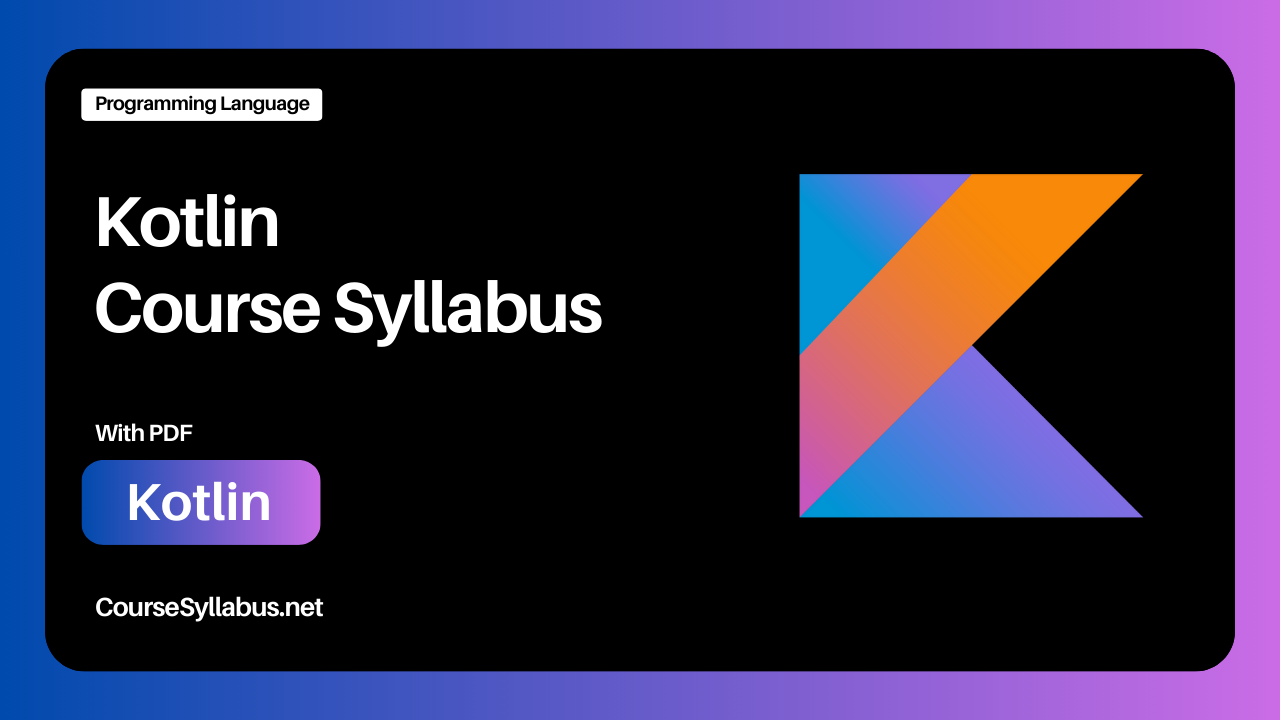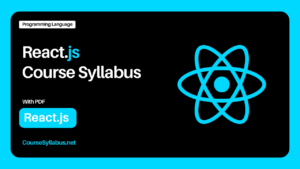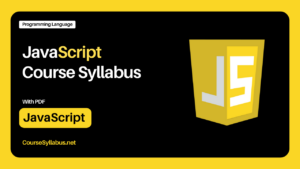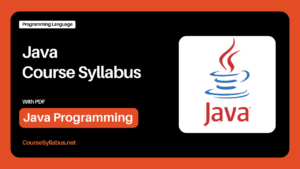Kotlin is a statically typed programming language that runs on the Java Virtual Machine (JVM), as well as on Android, JavaScript, and native code. It was developed by JetBrains, the company behind popular development tools like IntelliJ IDEA, Kotlin’s official IDE support.
Kotlin was designed to be fully interoperable with Java, meaning it can seamlessly integrate with existing Java codebases. Its syntax is concise and expressive, allowing developers to write clean and readable code with less boilerplate compared to Java.
Kotlin Course Syllabus
Module 1: Introduction to Kotlin
- Overview of Kotlin programming language
- Kotlin history and development
- Setting up Kotlin development environment
- Basic syntax and structure of Kotlin programs
- Variables, data types, and operators in Kotlin
Module 2: Control Flow and Functions
- Conditional statements (if, else if, else)
- Loops (for, while, do-while) in Kotlin
- Functions and function parameters
- Function overloading and default arguments
- Lambda expressions and higher-order functions
Module 3: Object-Oriented Programming in Kotlin
- Classes and objects in Kotlin
- Properties and methods
- Constructors (primary and secondary)
- Inheritance and interfaces
- Visibility modifiers (public, private, protected, internal)
- Data classes and object declaration
Module 4: Advanced Kotlin Concepts
- Extension functions and properties
- Sealed classes and enums
- Null safety and handling nullable types
- Delegation patterns (by keyword)
- Operator overloading
Module 5: Collections and Generics
- Overview of Kotlin collections framework (List, Set, Map)
- Immutable and mutable collections
- Working with collections using standard library functions
- Introduction to generics in Kotlin
- Variance (in, out) in generic types
Module 6: Coroutines and Asynchronous Programming
- Introduction to coroutines
- Coroutine basics (launch, async, suspend)
- Coroutine scopes and context
- Asynchronous programming with coroutines
- Exception handling in coroutines
Module 7: Kotlin for Android Development
- Introduction to Android development with Kotlin
- Setting up Android Studio for Kotlin development
- Kotlin Android extensions
- Using Kotlin with Android views and layouts
- Handling events and callbacks in Kotlin
Module 8: Kotlin for Web Development
- Overview of Kotlin frameworks for web development (Ktor, Spring Boot)
- Creating RESTful APIs with Kotlin
- Integrating Kotlin with frontend frameworks (React, Angular)
- Using Kotlin for server-side logic
Module 9: Testing in Kotlin
- Introduction to testing frameworks (JUnit, KotlinTest)
- Writing unit tests in Kotlin
- Test-driven development (TDD) principles
- Mocking and stubbing in Kotlin tests
Module 10: Best Practices and Advanced Topics
- Kotlin coding conventions and style guidelines
- Performance Considerations in Kotlin
- Advanced language features (DSLs, inline classes)
- Interoperability with Java
- Gradle build scripts with Kotlin DSL
Kotlin Learning Resources
There are many resources available for learning Kotlin ranging from online tutorials and courses to books and interactive platforms. Here are some popular options:
Key Points and Features of Kotlin
- Interoperability with Java: Kotlin seamlessly integrates with Java, allowing developers to leverage existing Java codebases and libraries without any hassle.
- Concise Syntax: Kotlin offers a more concise syntax compared to Java, reducing boilerplate code and enhancing code readability and maintainability.
- Null Safety: Kotlin’s type system distinguishes between nullable and non-nullable types, significantly reducing the occurrence of null pointer exceptions, a common source of bugs in Java code.
- Extension Functions: Kotlin enables developers to add new functionality to existing classes without modifying their source code, promoting code reuse and modularity.
- Coroutines for Asynchronous Programming: Kotlin’s built-in support for coroutines simplifies asynchronous programming, making it easier to write non-blocking, concurrent code.
- Immutable Data Structures: Kotlin provides immutable versions of common data structures, such as lists and maps, by default, helping to prevent unintended side effects and facilitating concurrent programming.
- Functional Programming Support: Kotlin supports functional programming paradigms, such as higher-order functions and lambda expressions, enabling developers to write more expressive and concise code.
- Smart Casts and Type Inference: Kotlin’s type system includes smart casts, which automatically cast types within certain control flow branches based on runtime checks, reducing the need for explicit type declarations and enhancing code clarity.
- Tooling and IDE Support: JetBrains provides excellent tooling support for Kotlin in its IDEs, such as IntelliJ IDEA and Android Studio, offering features like code completion, refactoring, and debugging, which enhance developer productivity.
- Growing Ecosystem: Kotlin has a vibrant ecosystem of libraries, frameworks, and tools, which continues to grow, expanding its applicability across various domains, including Android development, web development, and backend development.
Career Opportunities for Kotlin
Android Development: Use Kotlin to develop robust, efficient Android applications, replacing or complementing Java.
Backend Development: Utilize Kotlin to build scalable, high-performance server-side applications, often alongside frameworks like Spring Boot or Ktor.
Web Development: Employ Kotlin for full-stack web development, working with frameworks like Ktor for backend and frontend libraries such as React or Angular.
Cross-Platform Development: Leverage Kotlin Multiplatform to write shared codebases that run on multiple platforms, including Android, iOS, web, and desktop.
Tooling and Libraries: Contribute to or develop Kotlin-specific tools, libraries, and frameworks, enriching the Kotlin ecosystem and supporting fellow developers.
Consulting and Training: Provide consulting services to organizations adopting Kotlin, offering expertise on best practices, migration strategies, and training programs.
Freelancing and Contracting: Take on freelance or contract projects, leveraging Kotlin skills to deliver solutions tailored to client needs across various industries.
Research and Development: Engage in research or development roles, advancing the Kotlin language itself, exploring new features, or enhancing compiler tooling.
Startup Entrepreneurship: Found startups centered around Kotlin, developing innovative products and services, such as mobile apps, web platforms, or cross-platform solutions.
Academic and Training Institutions: Join academic or training institutions as an instructor or curriculum developer, imparting Kotlin knowledge to students or professionals.
Conclusion:
Kotlin opens doors to a wide array of career paths, spanning Android, backend, web, and cross-platform development. Opportunities also abound in tooling, consulting, and research roles. Proficiency in Kotlin equips individuals for dynamic and impactful careers, shaping the landscape of modern software development.




